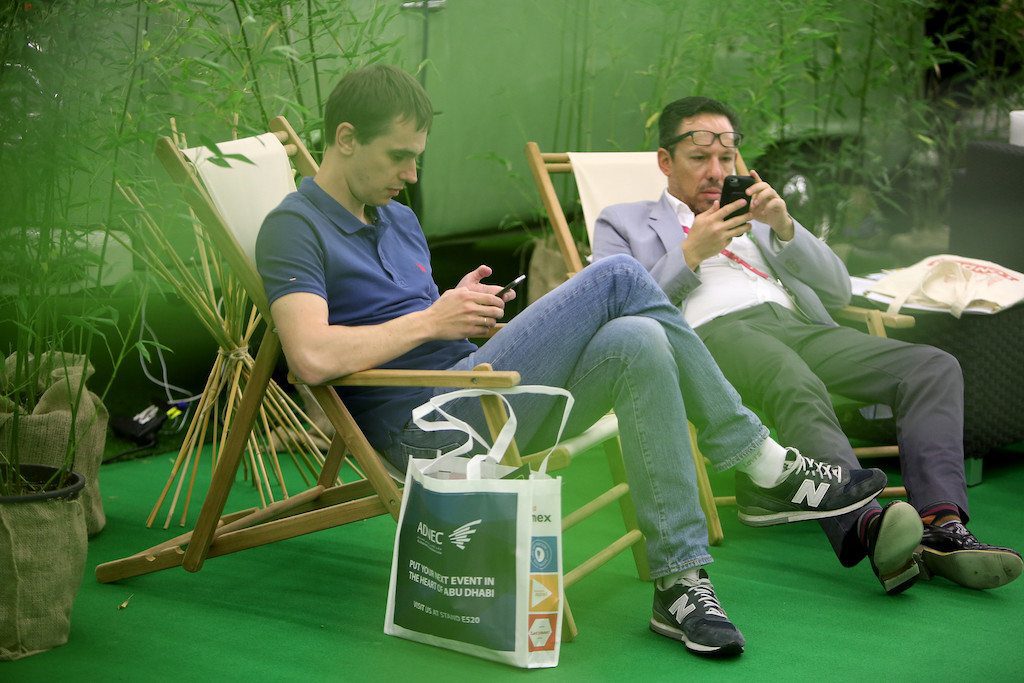Chatbots Are the Future of Meeting and Event Communication and Networking

Skift Take
When any of the IMEX Frankfurt attendees at this year's annual event for the global meetings industry needed to know the start time for a session, or where a particular exhibitor's booth was located, they simply reached for their phones and asked Frank.
Frank, a feature in the event's app, is an experimental chatbot that used artificial intelligence (AI) to interact with event attendees over messaging apps, and was capable of answering basic event questions via the event website and Facebook page. Armed with the goal of using "IMEX as a test bed for piloting new ideas under controlled and managed conditions and in a real-life environment," IMEXlabs partnered with messaging platform Scen.sio to develop Frank.
Frank passed his debut with flying colors, according to Miguel Neves, digital content and community manager at IMEX Group. Frank was "largely successful in answering the many questions fired at him. … We saw a significant improvement of the responses from the chatbot technology throughout the period it was in use. This was due to the Sciens.io team re-programming Frank during this period, and Frank's ability to constantly improve its answers," Neves said.
Improving Event Experiences
Over the past five years, artificial intelligence and machine learning have made substantial inroads into the mainstream and into our daily lives. Products such as Siri, Amazon Echo, and Google Home are fulfilling our desires for immediate answers, resolutions, and general information, and that has led to the surging popularity of chatbots. Messaging apps, including WhatsApp, Facebook Messenger, and Slack, all incorporate some text-based AI to help us connect.
With the AI market expected to grow to $4.05 billion by 2020, according to research firm Markets and Markets, it is clear these new self-learning and ever-improving technologies have limitless potential in a variety of industries, including events and conferences.
"AI and cognitive computing are impacting areas customer service in a big way," said IMEX's Neves. "Chatbots are still somewhat experimental, but many of the basic questions around events can be answered in a polite, personalized and accurate way 24/7. This is not too far from creating a well thought-out responsive website for the event, but goes much further in terms of usability."
With text-based services like meeting agendas, scheduling, floorplans, feedback polls and surveys, chatbots like Scens.io's Concierge EventBot, Event2Mobile's Eva, ConfBot, and
Morph.ai, can help event planners customize and personalize information to fit attendees' needs in an easy-to-use manner, allowing attendees and organizers make the most of their time and resources.
Enabling Smarter Networking
Another use for AI in the meetings and events industry is to facilitate networking between participants during events. For example, U.K.-based Grip is a smart event matchmaking app that is transforming some high-profile events, including the Cannes Lions Awards. Grip uses AI to process attendee profiles and behavior data to make matchmaking suggestions for professional networking.
"Overall, we believe that artificial intelligence enables us to enable people to network smarter with the goal being to spend less time looking at their phones at events and spend more time face-to-face," Grip co-founder and CEO Tim Groot said. "Just as Google enabled people to spend less time searching for information online our mission is to do the same thing for networking at events: more networking for your work."
Just how good is Grip's AI? At the Cannes Lion Awards, the event's Grip-enabled app had more than 750,000 swipes and made more than 10,000 digital "handshakes."
"We're delighted with the response to the new app, which transformed the way people met. With over 15,000 attendees this year, it was vital the right connections were made with the right people," said Cannes Lions digital project manager Richard Boswell.
Making the right connections — whether it's with potential clients or with the right information — is where AI can help events run smoother, save time and provide a personalized experience, Neves said. "Better designed events, with better technology will certainly produce even more valuable face-to-face interactions."




